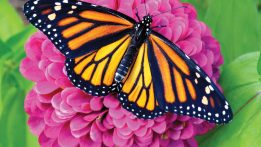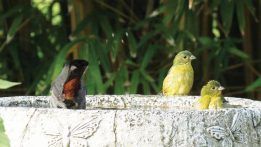 Tallahassee has a beautiful natural environment, and residents can help preserve it by using sustainable gardening practices in their yards. Rain gardens, specifically, help protect local water resources, such as lakes and streams.
Tallahassee has a beautiful natural environment, and residents can help preserve it by using sustainable gardening practices in their yards. Rain gardens, specifically, help protect local water resources, such as lakes and streams.
A rain garden is a slightly depressed area landscaped with flowers and other moisture‑tolerant plants, shrubs and trees (usually natives) to replace areas of lawn or bare ground. Rainwater collected from the roof, driveway or lawn is conveyed to this low spot where plants absorb the water or it filters into the soil where, over time, natural chemical and biological processes break down pollutants. A healthy rain garden is composed of loose, porous soil that is well mulched to create a dynamic system teeming with life. A well placed, carefully designed rain garden can capture runoff in all but the heaviest storms preventing your soil and fertilizer from entering the nearest stream or lake.
Facts about rain gardens:
- Containing the water flow helps reduce flooding and drainage problems in the community.
- Lawn fertilizers, pesticides, oil, car fluids and other substances are captured and broken down instead of polluting the nearby lakes and streams.
- Slowing the flow of water helps to prevent soil erosion.
- The beauty of the yard is enhanced with a low‑maintenance bed.
- Birds, butterflies and other wildlife are attracted to rain gardens.
Not only are rain gardens beautiful, fun, easy and beneficial, but now you can get financial assistance for planting one this year. Through the City of Tallahassee’s Rain Garden Grant Program, property owners within the city limits can apply for a grant to construct a rain garden on their property. Grants of up to $175 help to cover the cost of plants, mulch and compost used to establish the rain garden.
If your green thumb is broken, Think About Personal Pollution (TAPP) offers many other ways that you can help reduce pollution and improve our water quality:
- Help hold the water – slow the flow of water from your yard and allow it to filter into the soil through the use of berms and swales.
- Prevent erosion – keep your yard at home by mulching beds and bare areas of your yard and by terracing steeper slopes.
- Use fertilizers carefully – fertilizers belong on your yard, not in your lake. Select fertilizers for your lawn that have slow-release nitrogen and no phosphorus. Local soils generally have plenty of phosphorus to support a healthy lawn.
- Love your shoreline by placing buffers along the water’s edge to filter out contaminants before they pollute.
- Avoid spilling oil, gasoline or other chemicals on the ground.
- Pick up after your pet, especially before it rains.
- Take good care of your septic system and drain field. Check your septic system every 3‑5 years to ensure that it is working properly.
- Wash your car on your lawn or at a service station to prevent soapy water from entering our surface waters.
- Use rain barrels to collect water from your roof, and then use it to water your lawn and garden.
- Shop wisely and buy products labeled biodegradable, nontoxic, non-phosphorus or water-soluble.
- Never put leaf litter, trash, chemicals or pet waste down storm drains.
For more information about TAPP programs and to apply for a Rain Garden Grant, please visit www.TAPPwater.org or call 891‑8754. ![]()
By Courtney Schoen
City of Tallahassee, TAPP Coordinator




